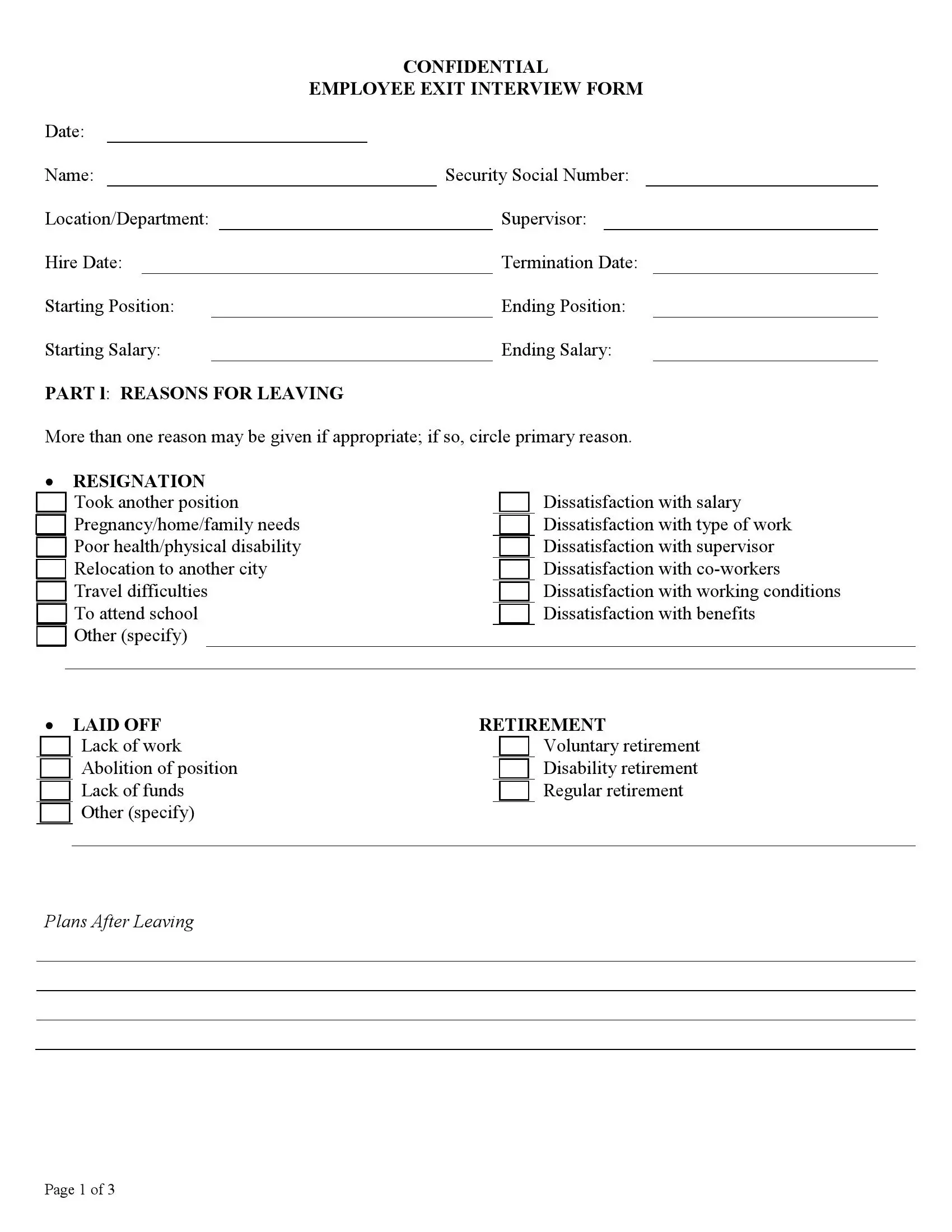As an employee preparing to leave your current job, you likely have insights and feedback you’d like to share with your management. Similarly, as an employer dealing with staff turnover, understanding the reasons behind your employees’ departures can be invaluable for the growth and improvement of your company. Using an Exit Interview Template can help facilitate constructive dialogue around the resignation process in both instances.
The exit interview is typically conducted when an employee has made the decision to resign and has informed their manager or supervisor of their intent to leave. In this article, we will discuss the benefits of using an exit interview form and provide guidance for employees on how to complete it effectively.
The Importance of Exit Interviews
Exit interviews play a crucial role in understanding the employee experience and identifying areas for improvement within an organization. These interviews provide valuable insights for both employers and employees, offering a platform for open communication and constructive feedback. Some key reasons highlighting the importance of exit interviews are:
- Identifying trends and patterns: Exit interviews can help uncover trends or patterns in employee dissatisfaction or areas that need improvement. Organizations can pinpoint recurring issues and address them proactively by analyzing feedback from multiple employees over time.
- Enhancing employee engagement: By showing a genuine interest in employees’ opinions and experiences, employers demonstrate their commitment to improving the work environment. This can contribute to higher employee engagement and satisfaction among the remaining staff, fostering a more positive work culture.
- Reducing employee turnover: Gaining insights into why employees leave can help organizations develop strategies to address the underlying issues and improve employee retention. Reducing turnover saves time and resources in recruiting and training new employees and contributes to overall company stability.
- Learning about management effectiveness: Exit interviews often provide feedback on managers and supervisors, helping organizations identify strengths and weaknesses in their leadership teams. This information can be used to improve management practices and offer targeted training and development opportunities.
- Assessing company culture: Employees leaving the organization may be more forthcoming about the work culture and any issues that exist. This feedback can help employers understand their company culture’s strengths and weaknesses and make necessary adjustments to create a more inclusive and supportive environment.
- Uncovering potential legal or ethical concerns: Exit interviews can help organizations identify potential legal, ethical, or compliance issues that may have gone unnoticed. Addressing these concerns promptly can minimize risks and protect the company’s reputation.
- Providing closure for departing employees: Exit interviews offer employees a chance to voice their concerns, share their experiences, and leave on good terms. This process can contribute to maintaining positive professional relationships and even future re-hiring opportunities.
How to Use the Employee Exit Interview Template
The use of the exit interview template will vary depending on your role within the company.
For employees preparing to resign, the exit interview template serves as an opportunity to communicate your reasons for leaving and any concerns or suggestions you have regarding the workplace. The template encourages you to share your perspectives on areas needing improvement and provide constructive feedback for your employer.
For employers who haven’t yet implemented exit interview templates, we highly recommend incorporating them into your resignation process. When completed honestly by departing employees, these templates can offer valuable insights that can be used to enhance the company’s operations, reduce future turnover, and identify underlying issues within your team and organization.
How to Fill Out the Exit Interview Form
Completing the Exit Interview Form template is a straightforward process. As an employee, your primary objective is to honestly describe your reasons for leaving and suggest possible improvements for your soon-to-be former employer.
To maintain a positive relationship, it’s advisable to provide your suggestions tactfully while still offering valuable critiques that could benefit the company in the long run.
Before diving into our step-by-step guide on filling out the template, ensure you have the correct template. You can access the appropriate form here on our site using our advanced form-building software that generates various forms in seconds. Open the file and begin completing the form digitally or print it to fill out by hand.
Step 1. Date the Document
Start by entering the current date at the top of the form.
Step 2. Add Personal Details
Provide your full name and Social Security Number (SSN).
Step 3. Insert Your Employment Details
Include information about your position, such as the department, supervisor’s name, hire and termination dates, starting and ending positions, and starting and ending salary.
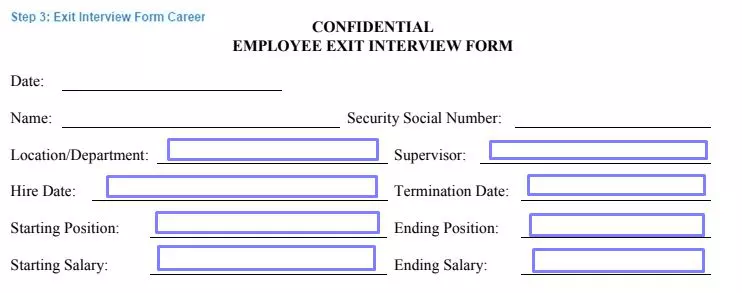
Step 4. Outline the Reasons for Leaving
The form’s next part is dedicated to the reasons why you have decided to leave your position in the company. This part is divided into several blocks with these options: Resignation, Laid Off, and Retirement.
You can select from over ten different explanations if your reason is resignation. They include relocation to another city, family needs, dissatisfaction with coworkers or work itself, and others. Mark the boxes that suit your case.
If you are quitting because you were fired, you may pick one of three options. However, they all describe the cases when people are fired for reasons beyond their control: lack of work, abolition of position, or lack of funds.
Lastly, if your choice is retirement, there are also three points to choose from: voluntary retirement, regular retirement, or disability retirement.

Step 5. Share Your Future Plans
Briefly describe your plans after leaving the company in the space provided.

Step 6. Provide Suggestions for Improvement
Complete the various sections designed to gather your feedback on different aspects of your job, including salary, benefits, training, promotion policies, management, and more. Give honest feedback and don’t hesitate to offer critique where necessary.
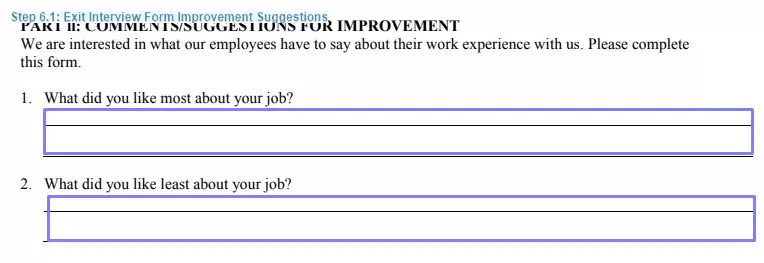
You will see a chart where you will need to choose from “excellent”, “good”, “fair”, and “poor.”

After estimating these vital elements, move to the chart below, where you will rate other features of your past job. Indicate your satisfaction or dissatisfaction regarding the following:
- Training you received
- Promotion policies and practices
- Discipline policies and practices
- Opportunities to use your abilities at work
- Your supervisor’s management skills
- Physical working conditions
- Overtime policies and practices, etc.
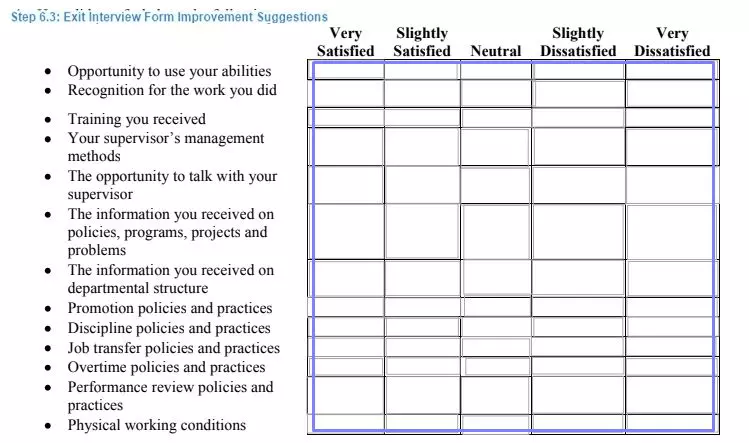
On the next page, you will see empty lines placed specially for your comments.

Step 7. Answer Additional Exit Interview Questions
Respond to the questions regarding your new position, new workplace, and potential improvements that might have convinced you to stay.
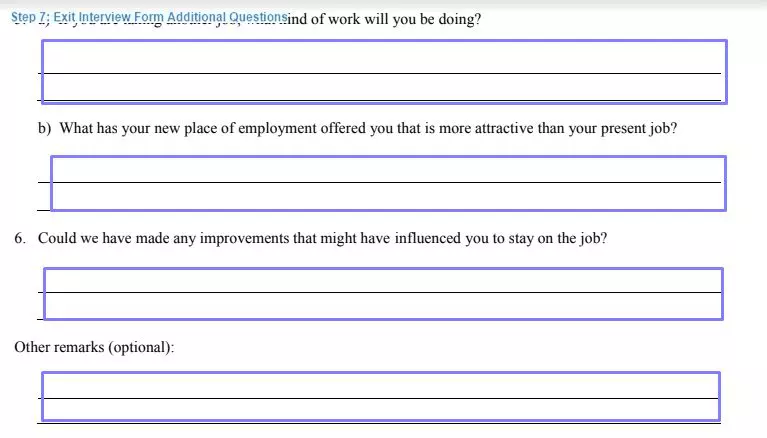
Step 8. Sign the Form
Sign and date the form to confirm your identity.

Step 9. Submit the Form to Your Company’s Representative
Under the signature, you will see a small block that you do not have to fill out. This block is only for your interviewer (or company’s representative) to complete.
After the form is complete, you will have an interview with the company representative, who will discuss everything that you have written, and you will be able to provide additional thoughts and comments on the document’s content.
Best Practices for Conducting Productive Exit Interviews
An effective exit interview process is essential to gather valuable feedback and insights from departing employees. Following these best practices will help ensure a productive and constructive conversation:
- Create a comfortable environment: Conduct exit interviews in a quiet, private space where employees feel at ease sharing their thoughts and experiences. The atmosphere should be relaxed and non-confrontational.
- Be prepared: Review the employee’s work history, performance, and accomplishments beforehand. Familiarize yourself with the exit interview form and any specific questions you want to ask. This preparation will help facilitate a more focused and insightful conversation.
- Keep it professional and objective: Approach the exit interview as a fact-finding mission rather than a personal discussion. Remain neutral, objective, and professional throughout the conversation to encourage open communication.
- Ask open-ended questions: Use open-ended questions that allow employees to express their thoughts and opinions freely. Examples include, “What did you enjoy most about your role here?” or “What factors contributed to your decision to leave?”
- Actively listen: Be attentive to the employee’s responses, taking notes when necessary, and showing genuine interest in their feedback. Avoid interrupting or jumping to conclusions; give them the time and space to share their perspective.
- Encourage honesty and candor: Ensure the employee that their feedback will be treated confidentially and emphasize the importance of honest feedback for organizational improvement.
- Probe for specific examples: If an employee mentions a concern or issue, ask for specific examples or situations to better understand the problem. This information can be invaluable in identifying areas for improvement.
- Discuss potential improvements: Ask the departing employee for suggestions on how the organization could improve or address the concerns they raised. This can offer valuable insights for future changes and demonstrate that you value their input.
- Stay focused on the employee’s experience: Keep the conversation centered on the employee’s experience, feedback, and suggestions. Avoid discussing gossip or delving into unrelated topics.
- Follow up and take action: After the exit interview, analyze the feedback and identify areas for improvement. Share relevant insights with key decision-makers and develop strategies to address the concerns raised. This follow-up demonstrates a commitment to growth and continuous improvement.
By following these best practices, you can ensure that exit interviews are an effective and constructive tool for gathering valuable insights and contributing to a better work environment.
